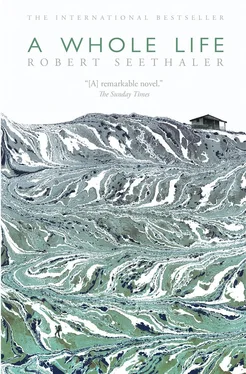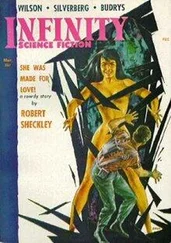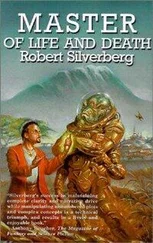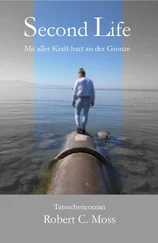Robert Seethaler - A Whole Life
Здесь есть возможность читать онлайн «Robert Seethaler - A Whole Life» весь текст электронной книги совершенно бесплатно (целиком полную версию без сокращений). В некоторых случаях можно слушать аудио, скачать через торрент в формате fb2 и присутствует краткое содержание. Год выпуска: 2015, Издательство: House of Anansi Press Inc, Жанр: Современная проза, на английском языке. Описание произведения, (предисловие) а так же отзывы посетителей доступны на портале библиотеки ЛибКат.
- Название:A Whole Life
- Автор:
- Издательство:House of Anansi Press Inc
- Жанр:
- Год:2015
- ISBN:нет данных
- Рейтинг книги:4 / 5. Голосов: 1
-
Избранное:Добавить в избранное
- Отзывы:
-
Ваша оценка:
- 80
- 1
- 2
- 3
- 4
- 5
A Whole Life: краткое содержание, описание и аннотация
Предлагаем к чтению аннотацию, описание, краткое содержание или предисловие (зависит от того, что написал сам автор книги «A Whole Life»). Если вы не нашли необходимую информацию о книге — напишите в комментариях, мы постараемся отыскать её.
Set in the mid-twentieth century and told with beauty and tenderness, his story is one of man's relationship with an ancient landscape, of the value of solitude, the arrival of the modern world, and above all, of the moments, great and small, that make us who we are.
A Whole Life — читать онлайн бесплатно полную книгу (весь текст) целиком
Ниже представлен текст книги, разбитый по страницам. Система сохранения места последней прочитанной страницы, позволяет с удобством читать онлайн бесплатно книгу «A Whole Life», без необходимости каждый раз заново искать на чём Вы остановились. Поставьте закладку, и сможете в любой момент перейти на страницу, на которой закончили чтение.
Интервал:
Закладка:
Egger didn’t usually speak on his walks. ‘When someone opens their mouth they close their ears,’ Thomas Mattl had always said, and Egger was of the same opinion. Instead of talking, he preferred to listen to these people, whose breathless chatter revealed to him the secrets of other fates and opinions. People were evidently looking for something in the mountains that they believed they had lost a long time ago. He never worked out what exactly this was, but over the years he became more and more certain that the tourists were stumbling not so much after him but after some obscure, insatiable longing.
Once, during a short break at the top of the Zwanzigerkogel, a young man grabbed him by the shoulders, quivering with emotion, and screamed at him, ‘Can’t you see how beautiful all this is!’ Egger looked into the man’s face, contorted with bliss, and said, ‘Yes, but it’s going to rain soon, and when the earth starts to slide you can forget about all the beauty.’
Only once in his career as a mountain guide did Egger almost lose a tourist. It was on a spring day sometime in the late Sixties; winter had returned again overnight, and Egger wanted to take a small group along the panoramic route above the new four-chair lift. As they were crossing the footbridge over the Häusler ravine, a fat lady slipped on the wet wood and lost her balance. Egger was walking right in front of her: out of the corner of his eye he saw her flailing her arms, and one of her legs rose up as if pulled into the air on an invisible string. Beneath the bridge was a twenty-metre drop. As he lunged towards her, his eyes were fixed on her face, tilting further and further back as if stricken with profound awe. He heard the wood groan as she crashed onto her back. At the very last moment, before she could slide over the edge and down into the abyss, he managed to seize one of her ankles with his hand, and even as he was marvelling at the unwontedly soft flesh beneath his fingers, his other hand grabbed her sleeve and he dragged her back onto the bridge, where she lay still, apparently contemplating the clouds with amazement.
‘That almost ended badly, didn’t it?’ she said. She took Egger’s hand, placed it on her cheek and smiled at him. Egger nodded, shocked. The skin of her cheek was damp. He sensed a barely perceptible quivering beneath his palm, and the contact seemed to him somehow improper. He was reminded of an experience from his childhood, when he was about eleven years old. The farmer had got him out of bed in the middle of the night: he had to help him deliver a calf. The cow had been labouring for hours, walking restlessly in circles and rubbing her muzzle on the wall until it bled. Finally she made a stifled noise and lay down on her side in the straw. In the flickering light of the kerosene lamp little Egger saw her roll her eyes and a glutinous slime flow from her cleft. When the calf’s front legs appeared, the farmer, who had been sitting on his stool throughout in silence, stood and rolled up his sleeves. But the calf didn’t move again, and the cow just lay there quietly. Suddenly she raised her head and began to bellow. It was a sound that filled Egger’s heart with cold horror. ‘It’s done for!’ said the farmer, and together they dragged the dead calf out of its mother’s body. Egger caught hold of the neck. The hide was soft and wet, and for a brief moment he thought he felt a pulse, a solitary throb beneath his fingers. He held his breath, but nothing followed, and the farmer carried the limp body out into the open. Outside day was already breaking. Little Egger stood in the stall, cleaned the floor, rubbed down the cow’s hide with straw and thought of the calf, whose life had lasted just a single heartbeat.
The fat lady smiled. ‘I think everything’s still in one piece,’ she said. ‘My thigh hurts a bit, but that’s all. Now the two of us can limp down to the valley side by side.’
‘No,’ said Egger, and stood up. ‘Every one of us limps alone!’
Since Marie’s death Egger had, from time to time, carried clumsy female tourists over a mountain stream or led them by the hand over a slippery ridge of rock, but apart from that he had never touched a woman more than fleetingly. It had been hard enough somehow to adapt to life again, and under no circumstances did he wish to forfeit the calm that had grown in him over the years. When it came down to it he had barely even understood Marie, and all other women were far more of a mystery to him. He didn’t know what they wanted or didn’t want, and much of what they said and did in his presence confused him, infuriated him, or provoked in him a kind of inner rigidity which he found very hard to shake off. On one occasion one of the seasonal workers thrust her heavy body with its kitchen smell up against him in the Golden Goat and whispered clammy words in his ear, which so flustered him that he rushed out of the inn without paying for his soup and spent half the night trudging over the frozen slopes to calm down.
There were often moments like these that had the capacity to stir him, but they occurred less frequently with every passing year and eventually ceased altogether. He was not unhappy about this. He had had a love, and he had lost her. Nothing comparable would ever happen to him again: that, for Egger, was a given. The struggle with lust, which still surged up in him from time to time, was a struggle he intended to conduct with himself, on his own, until the end.
In the early Seventies, however, Andreas Egger had another encounter which, for a few brief autumn days at least, conflicted with his desire to spend the rest of his life alone. Recently he had noticed that the atmosphere in the classroom behind his bedroom wall had changed. The children’s customary shouting had got louder, and when the break bell went, their outbursts and cheers of relief seemed to lack all inhibition. The reason for the pupils’ newly acquired, raucous self-confidence was clearly the retirement of the village schoolmaster, a man who had spent most of his life trying to implant at least the basic principles of reading and arithmetic in the lazy-minded heads of generations of farmers’ children, most of whom never thought beyond the here and now: if necessary, he would call on the assistance of a cudgel he had fashioned himself from an oxtail. After his final lesson the old teacher opened the window, tipped the box with the remaining pieces of chalk into the rose bed and turned his back on the village the very same day. This caused consternation among the local council members, particularly as they were unlikely to find a successor overnight who was keen to advance their career surrounded by herds of cows and skiers. A solution was found in the shape of Anna Holler, a teacher from the neighbouring valley who had retired many years ago, and who accepted the offer to fill in at the school with quiet gratitude. Anna Holler’s ideas about education differed from those of her predecessor. She trusted in the children’s innate powers of development, and she hung the old oxtail outside on the schoolhouse wall, where it weathered with the years and became a support for the wild ivy.
Egger, however, took a dim view of the new pedagogy. One morning he got up and went next door.
‘Excuse me, but it’s too loud. A man needs his peace and quiet, after all.’
‘Who in heaven’s name are you?’
‘My name is Egger and I live next door. My bed must be about here, right behind the blackboard.’
The teacher took a step towards him. She was at least a head and a half smaller, but with the children behind her, staring at Egger from their rows of seats, she appeared threatening and entirely unprepared to compromise. He would have liked to say more; instead, he just gazed mutely down at the linoleum. Suddenly he felt stupid standing there: an old man with ridiculous complaints, someone even little children could stare at in undisguised astonishment.
Читать дальшеИнтервал:
Закладка:
Похожие книги на «A Whole Life»
Представляем Вашему вниманию похожие книги на «A Whole Life» списком для выбора. Мы отобрали схожую по названию и смыслу литературу в надежде предоставить читателям больше вариантов отыскать новые, интересные, ещё непрочитанные произведения.
Обсуждение, отзывы о книге «A Whole Life» и просто собственные мнения читателей. Оставьте ваши комментарии, напишите, что Вы думаете о произведении, его смысле или главных героях. Укажите что конкретно понравилось, а что нет, и почему Вы так считаете.











